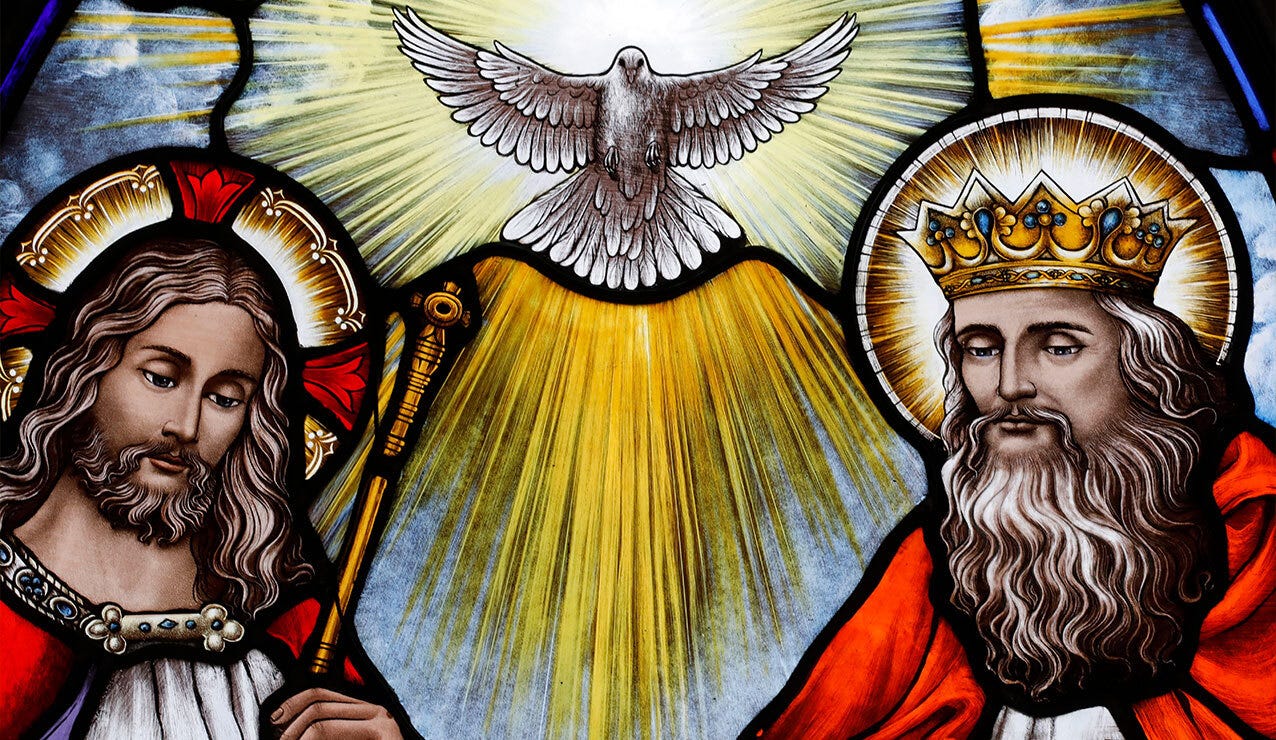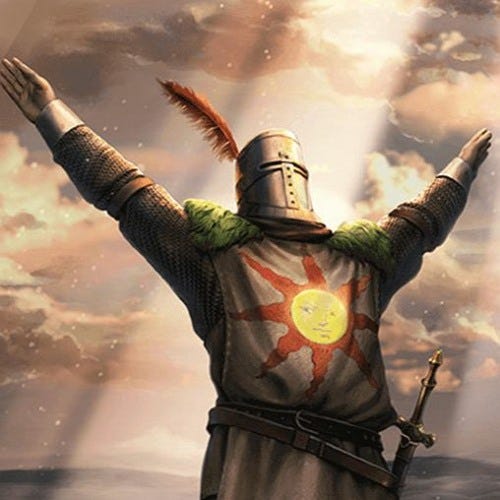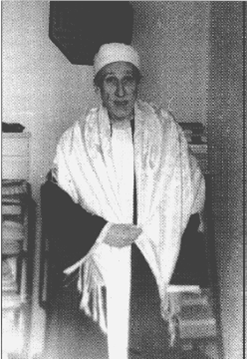I have had multiple people ask me to rewrite an old essay of mine from iFunny on the ‘Stack, regarding the Holy Trinity and its nature from a Pagan lens. It deals with the topic of the Holy Trinity, which I view as the fundamental difference between Christianity and other Abrahamic religions. I think that Muslims and Jews would agree with me on this. Where the Christian is primarily bothered by the lack of recognition of Jesus in Judaism, and the recognition of Muhammad in Islam, the primary arguments against Christianity I see from the Jewish and Islamic fronts have to do with the supposed polytheistic nature of the Trinity. Yes, there are some Christians who do not believe in the trinity — namely the historical Arian sect, modern Unitarians, and — if you can even call them Christian — the Mormons. I would consider Mormons about as Christian as Muslims. They do not believe in the Trinity, first of all. Secondly, they place emphasis on post-apostolic revelation and include it in the religious canon. But I digress.
Triune deities are extremely common in Pagan mythology, in fact they’re much more common than “diune” deities. Perhaps it has something to do with the qualifying characteristics of triples. Triples can be recognized not just as having three separate parts (I, II, III) but also having six separate binary relations (1-2, 1-3, 2-3). In a dyad, there is only one, and the two elements are only qualified with respect to each other. There is no external reference. Perhaps it has to do with the nonexistence of a two-sided shape in Euclidian space. There is a one-sided shape, the line. And there is a three-sided shape, the triangle. Maybe it’s just because 3 is a lucky number, but it’s extremely common world-round for deities to be recognized as belonging to a triad or forming a triple deity. The Slavic three-headed Triglav. The triple-faced Lugh. The Roman Capitoline Triad of Jove, Juno, and Minerva. The Memphite Triad of Ptah, Sekhmet and Nefertem. The Heliopolitan Triad of Hadad, Astarte, and Adon. The Ahuric triad of Mazda, Mithras, and Anahita. Many of these triads correspond to cosmic order, for example the Germanic Triad of Odin, Thor, and Freya. They correspond to the sacral, the martial, and the productive elements of traditional Indo-European society, although the Germanics eventually did away with a priestly class distinct from the warrior-aristocracy, there was still a clear recognition of these three distinguishing realms which themselves are found in every human being.
What we ought to be speaking of, is triads which were viewed by polytheistic cultures as fundamental. You probably are thinking of the Hindu Trimurti, the three highest personalities of the godhead. Brahma (creation), Vishnu (preservation), and Shiva (transformation). I will talk a little bit about the Trimurti in a minute, but I ought to talk about the main culprit people cite as Pagan influence to the Christian trinity — the Orphic-Neoplatonic triad of The One, the Intellect, and the Soul. The Intellect emanates from The One primarily, and the Soul either emanates from the Intellect, or from the One as a sort of residual element depending on who you are reading. Before I talk about that, I would like to talk a bit about the Demiurgic Triads of Greek religion. I discuss all of this in my ~10,000 word essay Chaoskampf as the Perennial Tradition, particularly in the section on the Indo-Europeans (obviously, the Greeks are Indo-European, so I discuss them in that section), and also I talk about Julian’s Solar Triad in my post on Sol Invictus.
There is firstly, the ‘horizontal’ Encosmic triad. There is the Zeus of the Sky, the Zeus of the Ocean (Poseidon), and the Zeus of the Underworld (Hades). Worth noting, Poseidon can be recognized as the Zeus of the entire earth-surface. That is why he is also the god of earthquakes and horses. He is not really a water-deity. Secondly, there is the triad of the office of Zeus — Ouranos-Kronos-Zeus. This encompasses the three gods who have held the kingly office of Zeus. Ficino identifies these three as representing the three different levels of the demiurge, which is similar to what Julian does with Helios. Ficino identifies Ouranos with the Pre-Essential Demiurge, Kronos with the Essential Demiurge (the creator of the Forms) and Zeus as the cosmic demiurge (the creator of the world), which I don’t agree with but I can’t help but associate with Julian’s Solar triad of Helios, which associates Helios with the One or the Pre-Essential Demiurge, and Mithras with the Intellectual Demiurge, and the Sun as their symbol in the world. Praise the sun!
Although these triads are important, as they seek to create a single force which they can attribute the entire vertical integration of reality to, they are not the likely candidates to have directly influenced the trinity. It is perfectly possible that they helped Christianity spread, as the Pagan environment (especially the Indo-European Pagan environment) was more familiar with them. However, the primary Platonic triad of The One, The Intellect and The Soul is the one which most likely had both a profound effect on Christian theologians, and was present in the east, where Christianity first grew to any significance. That’s because this triad is a central element of the Chaldean Oracles, a series of half-preserved texts attributed partially to Zoroaster himself, and partially to the miraculous Julian the Theurgist. It is clearly a mixture of Zoroastrian, Pre-Zoroastrian, Babylonian, and Platonic beliefs, but it describes the One as the Father, and from him comes two gods, the Intellect, and the World-Soul, which is called Hecate. However, later authors such as Proclus identify these with Zeus and Hera, which returns to the Platonic (as in, Plato himself) identification of the Intellect with Zeus. The Orphics also identify Zeus, through his assimilation of Metis, with the Intellect. The Father produces the intellect through his word. This principle act of creation, and one thing I find analogous to Christianity in this sense is the nature of the Intellect. The Intellect is seen as a multiplication of The One, rather than as some lesser being. The Intellect is the Dyad, as Pythagoras refers to it, while the Monadic Father is 1. If you would like to read more about why exactly the Intellect can be considered as a multiplication of the One, I would recommend Chapter 3 of
’s excellent essay on Monism, which I cite often because it is a great introduction to the core ideas for unawares. Even if you are a Christian, I recommend it, because it contains plenty of connections to Thomism. Macrobius refers to an interesting parallel in Babylonian/Assyrian mythology, albeit likely a folk etymology, relating to the god Adad/Hadad as meaning “One One”, where “Ad” means “one” or “once-beyond”. Proclus picks this up and explains it in his own commentaries:“There are many, saying a variety of other things, but they all try to direct the thought of the soul towards the One. The gods, knowing what concerns them, tend upwards towards the One by means of the One in themselves. And this precisely is their theological teaching: through the voice of the true theologians [= the Chaldean Oracles] they have handed down to us this hint regarding the first principle. They call it by a name of their own, ‘Ad’, which is their word for ‘one’; so it is translated by people who know their language. And they duplicate them in order to name the demiurgic intellect of the world, which they call ‘Adad, worthy of all praise.’ They do not say that it comes immediately next to the One, but only that it is comparable to the One by way of proportion: for as that intellect is to the intelligible, so the One is to the whole invisible world, and for that reason the latter is simply called ‘Ad,’ but the other which duplicates it is called Adad.”
—Proclus, Commentary to Plato’s Parmenides
This reminds me a lot of how the father does not create the son, but begets him. Albeit, the Platonists still recognize the One as causally superior to everyone else, the Intellect is similarly immortal to the one, and is constantly existing. Then finally, there is the Soul, which Proclus refers to as a “wine-bowl”, the passive receptive substance which the intellect morphs. Every physical object and every living being is imbued with the energy of Psyche, it is the animating force. The soul is seen as a mediator between the intellectual (noetic) realm, and the physical world we live in, just as how the holy spirit is a mediator between our world and the godhead. The Holy Spirit is dynamic, it is the action of God in this world. And what unites the One, the Intellect, and the Soul? Love. Just as God the father loves his son infinitely, and vice versa, and the Holy Spirit is sort of recognized as this love in a personal form.
So, clearly there is a strong connection between the Chaldean-Platonic triad and the Christian Trinity, but does that mean I think the Trinity is Pagan? Well, it certainly has a Pagan element to it, but there is a key difference between both the Platonic triad and the Hindu Trimurti, and the Christian Trinity. The Trinity is, at its core, not rational. It is supra-rational and supra-intelligible. The Trinity is actually a test of faith — you can not ever know the trinity. It is obviously not logical. Every attempt to compare the trinity to examples, or to explain the trinity, is either gibberish or it accidentally sets off a heresy. Usually one of the following:
Modalism — the view that the persons of God are simply different “modes” or attributes of God. That God is the father in one context, and the son in another.
Partialism — similar to Modalism, the idea that God is comprised of the three persons, and only together do they form God. Like the Constructicons from Transformers o algo.
Tritheism — the view that God is three separate beings, who are comprised of the same substance or participate in “god-ness”.
The Trinity does not make sense under Aristotelian or Stoic logic. x = a, x =! y, y = a (!?!?). Try as they may, I think the Thomists and the Augustinians and others will only get so far in their admirable but futile projects to integrate Platonism with Christianity. Christianity contrasts itself from Gnosticism (and arguably also Platonism) because it isn’t about Gnosis — knowledge of the world. It is about pistis, or faith, and this has been true about Abrahamism since the very beginning. Believe it or not, it’s actually stronger in Jewish and Muslim circles, that God has to be discovered through revelation, something which is obviously a posteriori and so requires some sort of leap of faith to believe in. From the Burning Bush to the Trinity, Abrahamism is full of leaps of faith. Kierkegaard considers this the very reason to become a Christian. Faith is actually self-actualizing:
“If I am capable of grasping God objectively, I do not believe, but precisely because I cannot do this I must believe. If I wish to preserve myself in faith, I must constantly be intent upon holding fast the objective uncertainty, so as to remain out upon the deep, over seventy thousand fathoms of water, still preserving my faith.”
—Soren Kierkegaard
I don’t hate what Kierkegaard is arguing here. It is one of the only arguments for Christianity which I kind of like, but it is totally Protestant. Luther felt the same way, he was tired of the Thomists. He was tired of the theorycels. When people foolishly say that the Ottomans stopped Islam from properly “reforming”, they have it backwards. Islam had already reformed back into this faith-obsessed state, which is why the greatest Islamic Aristotelians found more popularity in Italy than they did in the Middle East. Have you ever met a single Muslim convert who did so for rational reasons? I have never heard a single one say “yeah the arguments just all made really good sense to me”. It’s always “the religion makes me feel good” or “it is based and trad” or whatever. Some Islamic groups, like the Sufis, still hold to a more rational tradition influenced by Aristotle, Zoroaster, and the Hindoos. But most don’t.
So… The argument of “it is one God, deal with it” I think is pretty reasonable. What I am maybe less convinced on is the arguments defending how this God is a uniform God. But, Christians and Muslims and Jews (do I even have any Jewish subscribers?) can debate this in the comments. Not my problem.
Another key difference between the trinity and the pagan triads, is that the trinity is horizontal. The persons of the trinity are equal in authority and significance, meanwhile the Platonic trinity is vertical. The Monad is superior to the Intellect and the Soul, and the Intellect seems also to be recognized as superior to the Soul, but as I stressed before this depends on the author. The Trimurti is the same way. Not all Hindus agree on who exactly runs the show, but they generally agree someone is the head honcho. The Vishnaivites say that Vishnu, the principle of preservation, is the supreme personality of the godhead, and from him comes Shiva and Brahma. The Shaivites say that Shiva is the supreme personality of the godhead, and from him comes Vishnu and Brahma. Nobody thinks Brahma is the supreme personality, because Brahma is recognized as emerging once more at the start of every universe. In some, Krishna is actually the supreme being and Vishnu is his avatar (usually it is the other way around). Also, another obvious and glaring difference: Pagan triads follow heretical views of the trinity and Pagan ontologies are monistic. God in Platonism and Hinduism is all-encompassing. God in Christianity is not. Orthodox Christians are the closest to being Panentheistic, but even then I have heard it accurately described as “Pan-entheism” rather than “Panen-theism”, meaning that God’s presence is within all things but that those things are not necessarily within God. Anyways, the understanding of the Pagan trinity is that three deities participate in one greater essence, or that one greater deity emanates three deities from his qualities. You can see in this respect that different epithets of gods are in a minor sense, different deities. And of course, because we all participate in the oneness of being, this is the supreme reality. At least, the supreme describable reality.
This, combined with the later Cult of the Saints, would provide European Pagans a stronger sense of familiarity towards the new religion. Islam, flanked by Christianity and Zoroastrianism and Buddhism (and also a religion which spread by the sword) did not have nearly as much of a reason to entertain an idea like the holy trinity. And although the trinity may have a legitimate biblical origin, don’t think that means that it would inevitably be accepted. Arianism was very popular in late Roman Europe, especially among the Goths. The Lombards were also Arian, although some of them were still Pagan.





I know I'm late to this but this is a good video on this topic: https://m.youtube.com/watch?v=c3yXn1U-e0c
I was just re reading the parmenides an hour ago and thinking how strangely unique the Christian trinity is until I saw this noti... Not only that but reading the part about Adad reminded me of Guenons name later on abdul wahad and then I see his image... Get out of my walls, nigga.